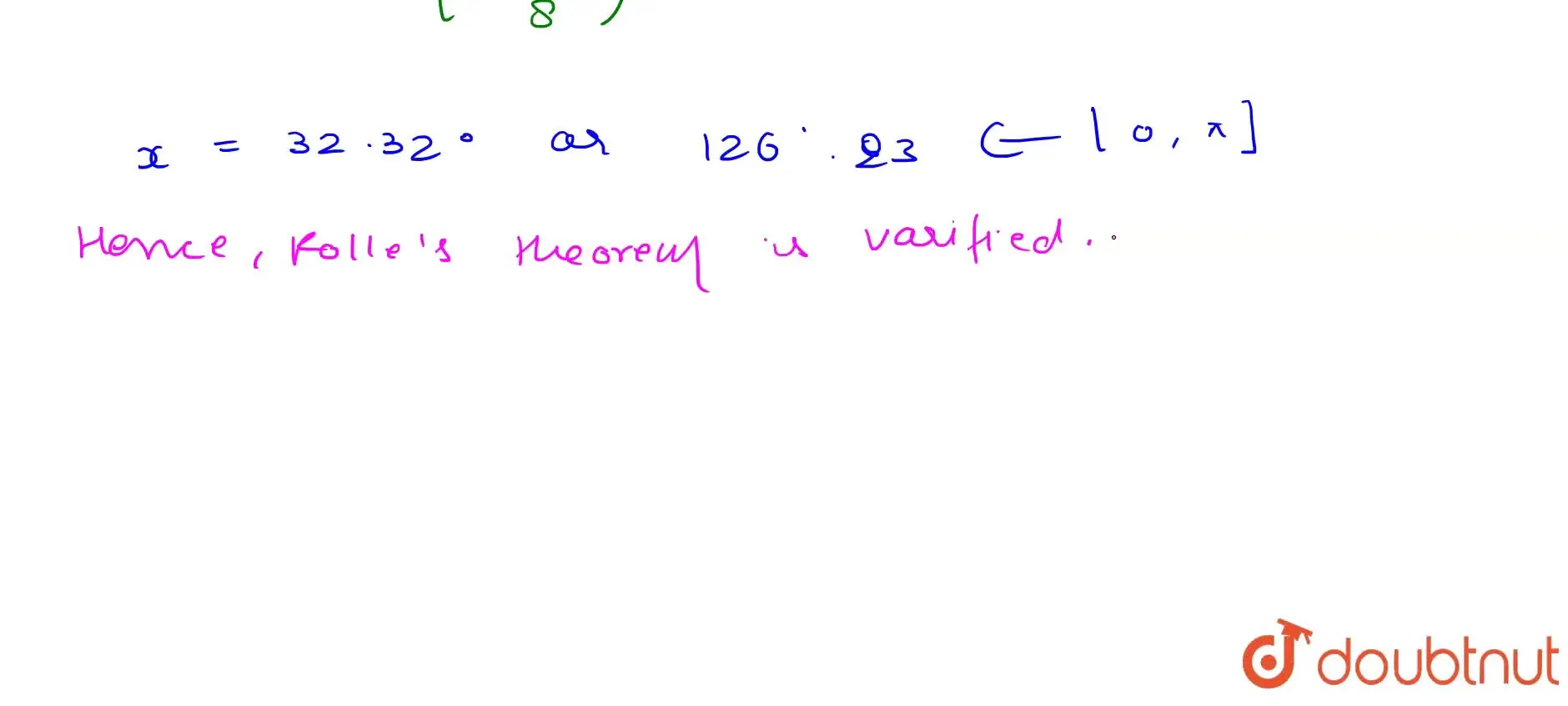Verify Rolle's theorem for each of the following functions:
(i) f(x)=sin2x in [0,π2]
(ii) f(x)=(sinx+cosx) in [0,π2]
(iii) f(x)=cos2(x−π4) in [0,π2]
(iv) f(x)=(sinx−sin2x) in [0,π]
(i) Consider f(x)=sin2x in [0,π2]
Since the sine functions is continouous at each x∈R, it follows that f(x)=sin2x is continuous on [0,π2]
Alos, f'(x)=2cos2x, which clearly exists for all x∈[0,π2]
So, f(x) is differentiable on [0,π2]
Alos, f(0)=f(π2)=0
Thus, all the conditions of Rolle's theorem are satisfied.
So, there must exist a real number c∈[0,π2] such that f'(x)=0
Now, f'(c)=0⇔2cos2c=0⇔cos2c=0
⇔2c=π2 i.e., c=π4
Thus, c=π4∈[0,π2]such thatf'(c)=0
Hence, Rolle's theorem is verified
(ii) Consider f(x)=(sinx+cosx) in [0,π2]
By the continuity of the sine function, the cosine function and the sum of continuous function, it follows that f(x) is continuous on [0,π2]
Also, f(x)=(cosx−sinx), which clearly exists for all values of x∈[0,π2]
So, f(x) is differentiable on [0,π2] Also, f(0)=f(π2)=1
Thus, all the conditions of Rolle's theorem are satisfied. So, there must exist some c∈[0,π2]such that f'(c)=0
Now, f'(c)=0⇔cosc−sinc=0⇔cosc=sinc⇔c=π4
Thus, c=π4∈[0,π2] such that f'(c)=0
Hence, Rolle's theorem is verified.
(iii) Consider f(x)=cos2(x−π4) in [0,π2]
SInce the cosine function is continuous everywhere, it follows that f(x)=cos2(x,π4) is continuous on [0,π2].
Also, f'(x)=−2sin(2x−π2)=2cos2x, which clearly exists
for all x∈[0,π2]
∴f(x) is differentiable on [0,π2]
Further, f(0)=cos2(−π4)=cos(π)2=0
And, f(π2)=cos2(π2π4)=cos(π)2=0
∴f(0)=f(π2)=0
Thus, all the conditions of Rolle's theorem are satisfied. So, there must exist c∈[0,π2] such that f'(c)=0
Now, f'(c)=0⇔2cos2c=0⇔2c=π2⇒c=π4
Thus, c=π4∈[0,π2] such that f'(c)=0
Hence, Rolle's theorem is verified.
(iv) Consider f'(x)=(sinx−sin2x) in [0,π]
Since the sine function is continuous, it follows that g(x)=sinxandh(x)=sin2x are both continuous and so their difference is also continuous
Consequently, f(x)=g(x)−h(x) is difference is also continuous.
Consequently, f(x)=g(x)−g(x) is differentiable on [0,π].
Also, f'(x)=(cosx−2cos2x), which clearly exists for all x∈[0,π].
∴f(x) is differentiable on [0,π]
And, f(0)=f(π)=0
Thus, all the conditions of Rolle's theorem are satisifed.
So, there must exist a real number c∈[0,π]such that f'(c)=0
Now, f'(c)=0⇔cosc−2cos2c=0
⇔cosc−2(2cos2c−1)=0
⇔4cos2c−cosc−2=0
⇔cosc=1±√338=0.8431or−0.5931
⇔cosc=0.8431orcos(180∘−c)=0.5931
⇔c=32∘.32'orc=126∘23'
Thus, c∈[0,π] such that f'(c)=0
Hence, Rolle's theorem is satisfied.
Related Playlists
- BOOK - RS AGGARWALCHAPTER - APPLICATIONS OF DERIVATIVESEXERCISE - Exercise 11A21videos
APPLICATIONS OF DERIVATIVES
- BOOK - RS AGGARWALCHAPTER - APPLICATIONS OF DERIVATIVESEXERCISE - Exercise 11B17videos
APPLICATIONS OF DERIVATIVES
- BOOK - RS AGGARWALCHAPTER - ADJOINT AND INVERSE OF A MATRIXEXERCISE - Exercise 737videos
ADJOINT AND INVERSE OF A MATRIX
- BOOK - RS AGGARWALCHAPTER - AREA OF BOUNDED REGIONS EXERCISE - Exercise 1739videos
AREA OF BOUNDED REGIONS
Similar Questions
Verify Rolle's theorem for each of the following functions :
f(x)=sinx+cosxin [0,π2]View SolutionVerify Rolle's theorem for each of the following functions :
f(x)=e−xsinx in [0,π]View SolutionVerify Rolle's theorem for each of the following functions :
f(x)=cos2x in [0,π]View SolutionVerify Rolle's theorem for each of the following functions :
f(x)=sinx−sin2x in [0,2π]View SolutionVerify Rolle's theorem for each of the following functions :
f(x)=cosx in [−π2,π2]View SolutionVerify Rolle's theorem for each of the following functions :
f(x)=e−x(sinx−cosx) in [π4,5π4]View SolutionVerify Rolle's theorem for the following functions f(x)=sinx+cosx+5,x∈[0,2π]
View SolutionVerify Rolle's theorem for each of the following functions:
(i) f(x)=sin2x in 0≤x≤π
(ii) f(x)=excosx in −π2≤x≤π2
(iii) f(x)=sinxex in 0≤x≤πView SolutionVerify Lagrange's mean-value theorem for each of the following functions
f(x)=(sinx+cosx) on [0,π2]View SolutionVerify Rolle's theorem for the following functions in the given intervals.
f(x) = sin 3x in the interval [0,π].View Solution


